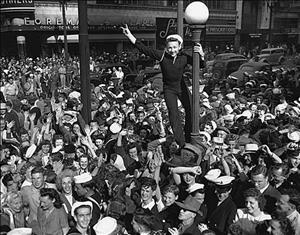On August 14, 1945, at 4 p.m. Pacific Time, President Harry Truman (1884-1972) on national radio states, "I have received this afternoon a message from the Japanese government of the unconditional surrender of Japan." Immediately the people of the state of Washington begin to celebrate. The celebration sweeps over Seattle "like a hurricane" (Seattle Star, August 15, 1945, p. 1).
Strangers Embraced
People exploded out of office buildings, manufacturing plants, and homes. Strangers embraced, reams of paper were thrown from business buildings onto the cheering people below, and autos honked and honked and honked. The war was finally over.
Nearly all businesses, taverns, and retail stores closed. Most remained closed for the next two days after Washington Governor Monrad "Mon" C. Wallgren (1891-1961) proclaimed a two-day holiday. Rationing, which during the war restricted purchases of gasoline, oil, tires, sugar, coffee, canned goods, bicycles, shoes, etc., was immediately suspended, except for butter and certain meats.
The Seattle Star published the impressions of reporter Louise Compton who was in downtown Seattle near 3rd Avenue and Pike Street after the announcement of Japan's surrender. Following are the reporter's notes describing the celebration:
"Wedging your way around on the corner of Third Avenue and Pike street in downtown Seattle shortly after President Truman's announcement of official surrender of the Japanese at 4 o'clock yesterday afternoon, sirens were droning and howling from all directions, people racing, others standing by with tears in their eyes, many showing smiles."There's a war off!
"Jams of automobiles with horns tooting. Ticker tape and confetti filling the air and tangling around ankles and shoulders. The sun beating down. Streets white with scrap paper. This is peace — Oh God! It's unbelievable.
"Cars honking incessantly — joyous faces! Blue between sky-line littered with clouds of falling paper. Long paper ribbons draped over light wires. Sailors whistling. General hubbub of noises. Guns shooting. B-29 Superfortresses overhead.
"A Seattle boy had returned from four and a half months in a German prison camp. He was glad he didn't have to go across now. 'This is what we've been fighting for,' he said.
"Jammed buses honking. So many cars. People don't care how much gas they're using now. Cars heedless of stop lights. Many people using cameras.
"'We ought to save a piece of this confetti for our grandchildren,' someone said. 'This is mad I'm telling you. Just look. We'll never see such an enthusiastic and wild demonstration again in our lives.'
"A small boy clung to his mother's skirts crying 'I'm scared.' One could hardly move in the wild, noisy jam of people.
"'This is the date for posterity to remember. It's unbelievable. I couldn't envision the end.'
"A burly policeman stood on the corner of Fourth avenue and Pike street shaking a finger at jammed cars.
"He will eventually get better so that he can walk around with a cane.
"A bulky parade of young civilians and mixed military singing, 'Hail, Hail the Gang's All Here' wound around automobiles in the middle of Third avenue. Cars and people in a muddle.
"'I want to go some place and cry. The fellows will be coming home now.'
"Jammed roadsters with the tops down and girls screaming and waving, sailors directing traffic. Post office steps jammed. 'Wonder where people get all this paper to throw around?' Navy shore patrols galore.
"'They still don't have Hitler.'
"Huge flags and red-lettered 'Victory' in windows of closed store" (Seattle Star).
World War II exacted a heavy toll. The nation lost 405,399 young men and women, and there were 670,846 wounded. From Washington state, 6,301 people lost their lives. Of these 2,488 were from King County.

